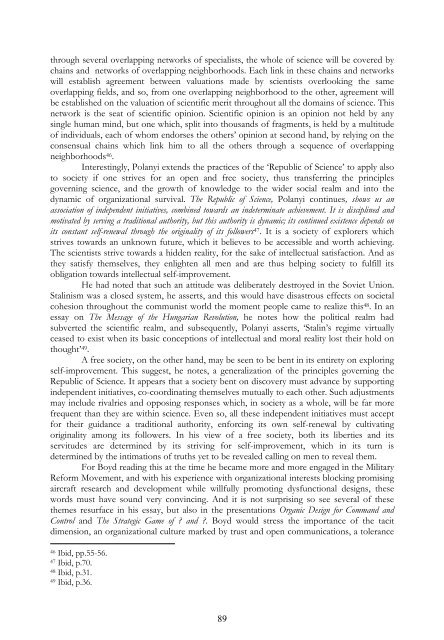Science, Strategy and War The Strategic Theory of ... - Boekje Pienter
Science, Strategy and War The Strategic Theory of ... - Boekje Pienter
Science, Strategy and War The Strategic Theory of ... - Boekje Pienter
You also want an ePaper? Increase the reach of your titles
YUMPU automatically turns print PDFs into web optimized ePapers that Google loves.
through several overlapping networks <strong>of</strong> specialists, the whole <strong>of</strong> science will be covered bychains <strong>and</strong> networks <strong>of</strong> overlapping neighborhoods. Each link in these chains <strong>and</strong> networkswill establish agreement between valuations made by scientists overlooking the sameoverlapping fields, <strong>and</strong> so, from one overlapping neighborhood to the other, agreement willbe established on the valuation <strong>of</strong> scientific merit throughout all the domains <strong>of</strong> science. Thisnetwork is the seat <strong>of</strong> scientific opinion. Scientific opinion is an opinion not held by anysingle human mind, but one which, split into thous<strong>and</strong>s <strong>of</strong> fragments, is held by a multitude<strong>of</strong> individuals, each <strong>of</strong> whom endorses the others’ opinion at second h<strong>and</strong>, by relying on theconsensual chains which link him to all the others through a sequence <strong>of</strong> overlappingneighborhoods 46 .Interestingly, Polanyi extends the practices <strong>of</strong> the ‘Republic <strong>of</strong> <strong>Science</strong>’ to apply alsoto society if one strives for an open <strong>and</strong> free society, thus transferring the principlesgoverning science, <strong>and</strong> the growth <strong>of</strong> knowledge to the wider social realm <strong>and</strong> into thedynamic <strong>of</strong> organizational survival. <strong>The</strong> Republic <strong>of</strong> <strong>Science</strong>, Polanyi continues, shows us anassociation <strong>of</strong> independent initiatives, combined towards an indeterminate achievement. It is disciplined <strong>and</strong>motivated by serving a traditional authority, but this authority is dynamic; its continued existence depends onits constant self-renewal through the originality <strong>of</strong> its followers 47 . It is a society <strong>of</strong> explorers whichstrives towards an unknown future, which it believes to be accessible <strong>and</strong> worth achieving.<strong>The</strong> scientists strive towards a hidden reality, for the sake <strong>of</strong> intellectual satisfaction. And asthey satisfy themselves, they enlighten all men <strong>and</strong> are thus helping society to fulfill itsobligation towards intellectual self-improvement.He had noted that such an attitude was deliberately destroyed in the Soviet Union.Stalinism was a closed system, he asserts, <strong>and</strong> this would have disastrous effects on societalcohesion throughout the communist world the moment people came to realize this 48 . In anessay on <strong>The</strong> Message <strong>of</strong> the Hungarian Revolution, he notes how the political realm hadsubverted the scientific realm, <strong>and</strong> subsequently, Polanyi asserts, ‘Stalin’s regime virtuallyceased to exist when its basic conceptions <strong>of</strong> intellectual <strong>and</strong> moral reality lost their hold onthought’ 49 .A free society, on the other h<strong>and</strong>, may be seen to be bent in its entirety on exploringself-improvement. This suggest, he notes, a generalization <strong>of</strong> the principles governing theRepublic <strong>of</strong> <strong>Science</strong>. It appears that a society bent on discovery must advance by supportingindependent initiatives, co-coordinating themselves mutually to each other. Such adjustmentsmay include rivalries <strong>and</strong> opposing responses which, in society as a whole, will be far morefrequent than they are within science. Even so, all these independent initiatives must acceptfor their guidance a traditional authority, enforcing its own self-renewal by cultivatingoriginality among its followers. In his view <strong>of</strong> a free society, both its liberties <strong>and</strong> itsservitudes are determined by its striving for self-improvement, which in its turn isdetermined by the intimations <strong>of</strong> truths yet to be revealed calling on men to reveal them.For Boyd reading this at the time he became more <strong>and</strong> more engaged in the MilitaryReform Movement, <strong>and</strong> with his experience with organizational interests blocking promisingaircraft research <strong>and</strong> development while willfully promoting dysfunctional designs, thesewords must have sound very convincing. And it is not surprising so see several <strong>of</strong> thesethemes resurface in his essay, but also in the presentations Organic Design for Comm<strong>and</strong> <strong>and</strong>Control <strong>and</strong> <strong>The</strong> <strong>Strategic</strong> Game <strong>of</strong> ? <strong>and</strong> ?. Boyd would stress the importance <strong>of</strong> the tacitdimension, an organizational culture marked by trust <strong>and</strong> open communications, a tolerance46 Ibid, pp.55-56.47 Ibid, p.70.48 Ibid, p.31.49 Ibid, p.36.89
















